|
|
|
Sort Order |
|
|
|
Items / Page
|
|
|
|
|
|
|
| Srl | Item |
| 1 |
ID:
184113
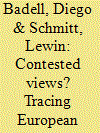

|
|
|
|
|
| Summary/Abstract |
The article explores the evolving positions and negotiation strategies of the EU and its member states regarding lethal autonomous weapon systems (LAWS). Specifically, it traces the proceedings around the UN disarmament forum Convention on Certain Conventional Weapons (CCW) from 2013 to 2020. Embedded in the norm contestation literature, the empirical section draws upon semi-structured interviews as well as document analysis. We find that, despite the absence of a CFSP position on the matter, the EU and key member states have been instrumental in shaping the discussions. However, the role of the EU is constrained due to double contestation. First, at the level of member states contestation persists on what is the appropriate regulatory framework (hard or soft law). Second, contestation is also exerted towards the EU by some member states who contest the EEAS’s involvement. Some are conscious that presenting an “EU position” might constrain their ability to build global coalitions. Others do not want the EU to interfere with their national sovereignty on such a critical security issue. While these two elements work against a common EU position, we also observe a window of opportunity for the EU. Notably, the EU can strengthen the CCW by funding the forum structures and secretariat, which could become an important body in the implementation of foreseeable agreements.
|
|
|
|
|
|
|
|
|
|
|
|
|
|
|
|
| 2 |
ID:
184112
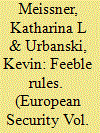

|
|
|
|
|
| Summary/Abstract |
Export controls of dual-use products and sanctions on respective items are highly regulated in the European Union (EU). However, we find multiple instances of implementation and application problems of dual-use control in the Member States. To explain this puzzling observation, we investigate the relationship between the institutional design of sanctions and their subsequent implementation and application. Drawing on rational design theory, we argue that even if coherence is the EU’s stated goal, the institutional design of the current dual-use export control regime is inadequate to provide for coherence. National licensing decisions and a constant need for the interpretation of contingent rules in the implementation and application of dual-use sanctions are structural challenges to establish a coherent European policy. The relationship between institutional design and coherence, which we investigate in the context of sanctions, is not specific to the EU. Instead, we offer a novel conceptual and analytical tool to study the expected degree and causes of (in-)coherence in the implementation and application of any regime of international sanctions.
|
|
|
|
|
|
|
|
|
|
|
|
|
|
|
|
| 3 |
ID:
184116
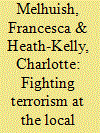

|
|
|
|
|
| Summary/Abstract |
In this article, we investigate how the EU mobilises a spatio-temporal imaginary of the “local” in its counter-radicalisation activities as a means of navigating subsidiarity principles and expanding its remit as a “holistic security actor” (cf. Baker-Beall [2016]. The European Union’s fight against terrorism: discourse, policies, identity. Manchester: Manchester University Press). Extant work on the EU’s terrorism prevention efforts has focused on how the organisation constructs transnational terror threats that require supranational, EU-level responses. Our research makes an original contribution to these literatures by demonstrating how the EU also seeks to intervene “below” the level of the nation state. EU counter-radicalisation works directly with subnational actors in municipalities, cities, and frontline public services across Member States. Employing the first systematic analysis of the EU’s Radicalisation Awareness Network (RAN) outputs, we demonstrate how “the local” frames pre-emptive counter-terrorism interventions as “upstream”. “Closer”, or “localised”, reads as “earlier” in this discourse. We also unpack how EU institutions and Member States have voiced concerns about the circumvention of subsidiarity (through engagement with local actors across the Union), by criticising the “effectiveness” of RAN. While the European Commission has taken steps towards addressing these grievances, its proposals reflect a further renegotiation and repositioning of the EU as a security “facilitator” across spaces deemed simultaneously local and transnational.
|
|
|
|
|
|
|
|
|
|
|
|
|
|
|
|
| 4 |
ID:
184111
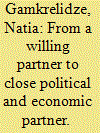

|
|
|
|
|
| Summary/Abstract |
This article explores EU political elites' images of Georgia and its evolution from 1991 to 2020. The analysis relies on the author’s 25 original interviews with EU political elites, including presidents, prime ministers and ministers of EU member states and EU commissioners, alongside primary documents. By triangulating between novel interview data, document analysis and statements by EU officials, this article unpacks EU perceptions of Georgia’s intentions, capabilities, threats and cultural status over a 30-year historical period. The study shows that three main images of Georgia have emerged over time in the eyes of EU and EU member states leaders: first, Georgia as a willing partner to the EU; second, Georgia as a political partner to the EU and third, Georgia as a close political and economic partner to the EU. This article, by studying the EU political elites’ images of Georgia, adds knowledge to the EU’s perceptions of external actors, which is an under-researched topic in the scholarship of images and perceptions in EU external relations. Moreover, it extends the literature on EU–Georgia relations, and helps to understand some of their peculiarities.
|
|
|
|
|
|
|
|
|
|
|
|
|
|
|
|
| 5 |
ID:
184115
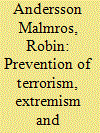

|
|
|
|
|
| Summary/Abstract |
National approaches to prevent terrorism, extremism, and radicalisation have changed considerably over the last decades. Previous studies mapping these changes have primarily relied on empirical analyses of formal policy and political processes. This case-study of Sweden takes an alternative route, and analyses a dataset of 1405 Swedish newspaper articles (1985–2019) using a new institutional theory and social movement theory framework. Therethrough, the paper is able to provide new insights into the emergence and development of an institutional issue field concerned with the prevention of terrorism, extremism, and radicalisation. More specifically, the paper highlights the unstable, fragmented, dynamic and contested character of the field’s development. Frames containing the problems and solutions considered most important during each of the field’s five stages are identified, and the subsequent institutional and organisational consequences are discussed. The paper also considers how terror attacks and other extremism-related events impact the institutionalisation and alternation of dominant frames, and identifies the translation and development of an inclusive vocabulary as pivotal to mobilising a broad and diverse set of actors to co-produce preventive efforts.
|
|
|
|
|
|
|
|
|
|
|
|
|
|
|
|
| 6 |
ID:
184114


|
|
|
|
|
| Summary/Abstract |
The concept of Normative Power Europe (NPE) has sparked widespread debate over the EU’s external relations and its role in world politics. Whist the EU studies community has engaged with the NPE literature and studied EU norm-entrepreneurship at theoretical and empirical levels, the NPE literature suffers from two major shortcomings: first, it falls short in uncovering the multifaceted nature of EU diffusion objects across different policy areas; second, the effectiveness of EU norm diffusion remains underexplored. To remedy these limitations, this article aims to provide a more nuanced understanding of the EU’s projection of normative power by drawing on analytical tools from diffusion literature. By doing so, this research argues that the EU’s projection of normative power in relation to other international actors can be conceptualised as a process of diffusion of EU norm-clusters in various policy areas. It also reconceptualises the impact of the EU’s normative power as varying diffusion outcomes. By undertaking an empirical case study of the EU–ASEAN security cooperation, this research adopts the analytical framework to unpack the EU’s projection of normative power and diffusion of security-related norm-cluster in relation to ASEAN.
|
|
|
|
|
|
|
|
|
|
|
|
|
|
|
|
| 7 |
ID:
184110
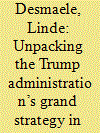

|
|
|
|
|
| Summary/Abstract |
Observers continue to disagree on what, if anything, constituted the overarching logic guiding American foreign policy under the Trump administration, i.e. on how to describe Trump’s grand strategy. Rather than assessing the Trump administration’s statecraft on its own terms, however, most scholars fast forward to prescribing potential alternative approaches. To that end, they often cherry-pick different bits of empirical data to support their argument, without a clear theoretical or methodological justification. This is problematic, for the crucial question of whether Trump’s grand strategy was feasible and consistent with US interests cannot be properly answered without a shared baseline of what it precisely entails. In response, this article analyses factors from a variety of methodological perspectives – preferred modes of action, institutional commitments and discourses. An analysis of these factors in the context of Europe reveals that Trump pursued an onshore balancing strategy that built on three interrelated elements: power maximisation, relative gains and sovereignty. When transposing these elements to the European theatre, it appears that Trump's team pushed for a Europe that was divided, weak and relatively inconsequential as Washington sought to outcompete Beijing in order to retain global primacy.
|
|
|
|
|
|
|
|
|
|
|
|
|
|
|
|
| 8 |
ID:
184109
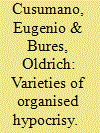

|
|
|
|
|
| Summary/Abstract |
International organisations (IOs) have increasingly resorted to private military and security companies (PMSCs) as providers of armed protection, training, intelligence, and logistics. In this article, we argue that IOs, seeking to reconcile conflicting international norms and member states’ growing unwillingness to provide the manpower required for effective crisis management, have decoupled their official policy on and actual use of PMSCs, thereby engaging in organised hypocrisy. Due to its stricter interpretation of norms like the state monopoly of violence, the United Nations (UN) has showcased a more glaring gap between talk and action than the European Union (EU) and the North Atlantic Treaty Organization (NATO), which display a more pragmatic, but not entirely consistent, approach to the use of PMSCs. By examining the decoupling between UN, EU, and NATO official contractor support doctrines and operational records, this article advances the debate on both security privatisation and organised hypocrisy.
|
|
|
|
|
|
|
|
|
|
|
|
|
|
|
|
|
|
|
|
|